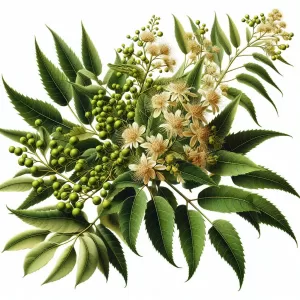In a world where the quest for well-being and natural health is gaining more and more ground, medicinal plants offer a fascinating alternative to conventional treatments. From the ancient milk thistle to the versatile artichoke, these gifts of nature are full of stories, therapeutic properties, and benefits for our bodies.
I. Milk Thistle (Silybum marianum):

Milk thistle (Silybum marianum), recognized for its therapeutic properties since Antiquity, is particularly valued for its ability to protect the liver and promote its regeneration. This plant contains silymarin, an active compound that encompasses silybin, silychristin, and silydiamine, playing a key role in liver protection against various toxins (alcohol, drugs, etc.). The World Health Organization (WHO) as well as Commission E of the German Ministry of Health have clinically validated the use of milk thistle extracts in the complementary treatment of acute and chronic hepatitis.
Milk thistle comes in various forms for its therapeutic use, including herbal tea, powder, capsule, or hydro-alcoholic extract, each with specific dosage and dosage recommendations to maximize its benefits. In addition to impacting liver health, milk thistle positively affects digestion and blood sugar levels, and its detoxifying properties even contribute to managing acne.
Its history dates back two thousand years, being used as both a folk and traditional medicine in Europe and Asia. The plant is also rich in active compounds like flavonoids, which have anti-inflammatory and antioxidant properties, helping to reduce free radical damage and limit inflammation.
However, it is important to note the precautions for use and contraindications of milk thistle, particularly in cases of allergies to Asteraceae, pre-existing liver disorders, for pregnant or breastfeeding women, and in the case of use of specific medications, because it can interact with them and influence their effectiveness. Patients may experience side effects, mainly gastrointestinal (nausea, abdominal pain, etc.), but they are generally considered mild.
Finally, a holistic approach in the treatment and prevention of disease highlights the importance of integrating medicinal plants like milk thistle into health and wellness regimes.
II. Dandelion (Taraxacum officinale):

Dandelion (Taraxacum officinale), often wrongly considered as a simple weed, is full of health benefits, thanks to its rich composition of vitamins (A, C, K), minerals (calcium, iron, potassium), antioxidants, and phytochemicals. Its diuretic properties, in particular, earn it its evocative name, helping to stimulate diuresis and support liver function for effective internal purification.
Dandelion leaves are valued for their mineral and vitamin content, helping to treat inappetence, as well as stomach or urinary disorders. They act as an anti-inflammatory and have beneficial effects on the liver and kidneys, helping to manage high blood pressure, heart failure, and, in rare cases, hyperkalemia. Experts recognize the plant for its cholagogue and choleretic properties, which are useful in cases of liver and biliary disorders.
The recommended dosage for dandelion leaves varies: as an infusion, you can use 4 to 10 grams of leaves in 150 ml of water up to three times a day. You can take the roots as a decoction, extract, or tincture, with dosages ranging from 750 to 1250 mg three times a day for extracts. Besides its medicinal use, you can incorporate dandelion into the diet in the form of salads or culinary preparations.
It is important to pick dandelions in unpolluted areas, far from traffic and pesticides, and to favor young leaves and flowers for their tenderness and sweet flavor. Despite its many benefits, health professionals do not recommend using dandelion in cases of pregnancy, breastfeeding, heart or kidney disease, and for people allergic to plants in the Asteraceae family.
In summary, dandelion offers a complete approach to internal detoxification thanks to its multiple contributions, supporting liver function and stimulating diuresis.
III. Neem (Azadirachta indica):

Neem (Azadirachta indica), also known as Indian Lilac, is a plant with multiple medicinal properties, known for its antiseptic, antiviral, and antibacterial properties. It plays a crucial role in detoxification by purifying the blood and helping eliminate toxins that cause infections and inflammation.
In terms of medical research, Neem has shown the potential to induce apoptosis, a process of programmed cell death, which destroys abnormal cancer cells. This property is particularly beneficial for patients suffering from leukemia, as studies have shown that Neem leaf extract induces apoptosis of leukemia cells. Clinical studies have also revealed that Neem may have a beneficial effect on gastritis by reducing gastric acid secretion and peptic ulcers by speeding their healing.
Neem also has a protective effect on the liver, providing a shield against damage caused by certain medications. It promotes wound healing, thanks to its healing properties, and shows significant antiviral activity, particularly against herpes simplex virus (HSV-1) and Coxsackie virus, thus helping in faster recovery from viral infections.
With its wide applications and health benefits, Neem presents itself as a powerful natural resource for supporting general health and well-being.
IV. Gotu Kola (Centella asiatica):

Gotu Kola (Centella Asiatica) is a plant with multiple benefits, widely recognized in traditional medicine for its positive impact on skin health, blood circulation, and cognitive functions. Its richness in asiaticoside stimulates the production of collagen and the formation of new blood vessels, which is crucial in the wound-healing process. Additionally, Gotu Kola helps balance inflammation and promotes healthy scar formation. It is also used to improve blood circulation by strengthening weakened veins and enhancing circulation from the lower body to the heart.
Gotu Kola has proven itself in the treatment of chronic venous insufficiency of the lower extremities, where patients showed significant improvement in symptoms such as heaviness and edema of the legs, following administration of Gotu extracts. Kola. It also has positive effects on the blood sugar management, thanks to its ability to reduce glucose levels. Research has shown that Gotu Kola can lower LDL cholesterol, contributing to better blood sugar balance.
Its antimicrobial properties, although moderate, include antibacterial and antiviral actions. Studies have confirmed the antibacterial activity of Gotu Kola extract against H. pylori, a bacteria that in excess can lead to infections and damage the gastrointestinal tract.
Regarding cognitive improvements, Gotu Kola appears to induce neuronal growth, not by increasing the number of neurons, but by extending their dendrites. Activating a class of proteins called MAPKs achieves this, releasing a neuronal growth factor known as Brain-derived Neurotrophic Factor (BDNF).
This property, similar to that of Bacopa monnieri, requires a few weeks to become effective. Gotu Kola also increases the secretion of an anti-inflammatory signaling molecule by immune cells, which could explain its benefits on chronic venous insufficiency and its anti-rheumatic benefits.
The dosage of Gotu Kola varies depending on usage. For chronic venous insufficiency, human studies have used 60-180 mg of total saponins per day. Although there are no human studies on cognitive enhancement, research on rats suggests a dose of 32-48 mg/kg for humans, which translates to approximately 2,100-5,500 mg for a person. person, depending on body weight. Doses of 500 mg twice daily have shown reduced effects on anxiety in humans.
It is advisable to consult a healthcare professional before adding Gotu Kola to your diet, especially if you are taking medications to reduce blood sugar, due to its potential effect on glucose levels.
V. Artichoke (Cynara scolymus):

The artichoke (Cynara scolymus) is recognized for its numerous health benefits, particularly for the liver and digestion. This Mediterranean plant, rich in cynarin and chlorogenic acid, stimulates the production and elimination of bile, thus facilitating the digestion of lipids and contributing to better liver function. One study showed that consuming artichoke leaf extracts led to a significant increase in bile flow, thereby improving fat digestion and helping with chronic constipation due to hepatobiliary weakness.
In addition to improving difficult digestion, artichoke helps treat hepatobiliary dysfunctions like jaundice and liver failure, bloating, and nausea. It also facilitates renal and urinary elimination and fights against constipation by stimulating bile secretion. Its properties do not stop there; the artichoke also helps prevent type II diabetes by regulating blood sugar levels and helps prevent cardiovascular disease by limiting the formation of atheromas in the arteries.
For optimal use, artichoke can be consumed in various forms, such as capsules, infusions, dried leaves, tinctures, or fluid extracts, each with a specific dosage. It is important to consult a doctor before starting artichoke treatment, especially if you are sensitive to plants in the Asteraceae family or if you have bile duct obstruction. Side effects are usually minor but may include gas, diarrhea, or temporary loss of appetite.
Conclusion:
Medicinal plants such as milk thistle, dandelion, neem, Gotu Kola, and artichoke are valuable allies for health and well-being. Their use, anchored in tradition and increasingly supported by scientific research, offers a promising avenue for the prevention and complementary treatment of various ailments.

